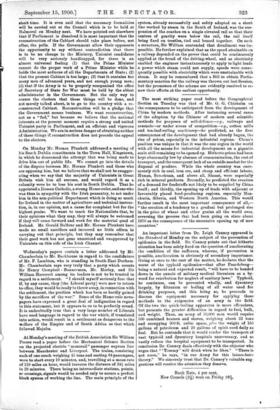At Monday's meeting of the British Association Sir William Preece
read a paper before the Mechanical Science Section on the projected electric " monorail" passenger express line between Manchester and Liverpool. The trains, consisting each of one coach weighing 45 tone and seating 64 passengers, were to start every 10 minutes, and, travelling at a mean rate of 110 miles an hour, would traverse the distance of 34 miles in 20 minutes. There being no intermediate stations, points, or crossings, signals would be needed only to secure a perfect block system of working the line. The main principle of the
system, already successfully and safely adopted on a short line worked by steam in the South of Ireland, was the sus- pension of the coaches on a single elevated rail so that their centres of gravity were below the rail, the rail itself being fixed on trestles, tied and braced together. On such a structure, Sir William contended that derailment was im- possible. He further explained that as the speed attainable on a railway depended on the power that could be continuously applied at the tread of the driving-wheel, and as electricity enabled the engineer instantaneously to apply to light loads a power which steam could not supply, speeds were conse- quently possible with electricity which were unattainable with steam. It may be remembered that a Bill to obtain Parlia- mentary sanction for the railway was thrown out last Session, but the promoters of the scheme are evidently resolved to re- new their efforts at the earliest opportunity.






































 Previous page
Previous page